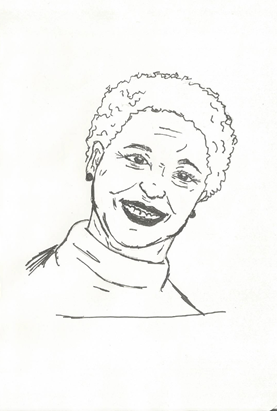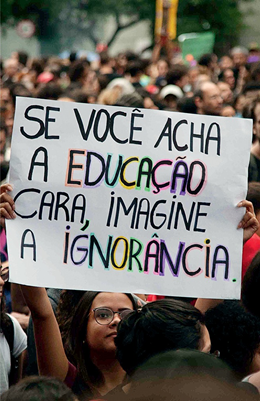by Patrice Schuch and Mário Saretta
Translated by Matheus Zago Reviewed by Matheus Lucas Hebling
Original text published in Portuguese May 07, 2020 link
The coronavirus pandemic, among explicit policies and ordinary practices, exposes life-and-death decisions that require thoughts about possible outcomes. The effects of the pandemic do not only involve the relationship between a virus and bodies but rather are produced politically, based on unequal conditions and situations of life and practices, programs, and policies for its consideration.
In the case of people with disabilities, the coronavirus pandemic has highlighted how much disability is created out of the use of social inequality markers, which put these people at risk. According to the most recent data in Brazil, referring to the 2010 IBGE Census, disability is not only relational and political but deeply inter-sectional, set up by the overlapping of unequal dynamics of gender, class, and race/ethnicity. As many researchers in the human sciences have stressed, in the face of the coronavirus pandemic, inequalities become sharper and the conditions of life make a genuine change, even in more generalist guidelines of social isolation, the #fiqueemcasa (#stayathome).
For people with disabilities who need care staff, for example, such guidelines are complex and make it necessary to extend control strategies that are suited to the particular needs of the patient’s dynamics.
Patients who must follow medical protocols that require hospitalization and/or frequent hospital visits, even in periods of a health crisis, are also at substantial risk, which needs to be considered.
Isolation conditions can elevate mental suffering to extreme levels to people with cognitive disabilities. Here, the creation of therapeutic spaces must be in line with social distancing policies to produce policies that protect people, according to their specificities. In the city of Tarragona (Spain), for example, children with an autistic spectrum were allowed to walk with their caregivers in case of need, as long as they respected social distancing measures.
The absence of practices and programs that work from the dynamics associated with people with disabilities implies a dramatic exposure to death, even indirectly, in the coronavirus pandemic. Such a policy is promoted with an emphasis on generalist policies assuming a universal, autonomous, and self-sufficient person who can sanitize himself, distance himself and protect himself from the virus, however, in other dynamics triggered in the spread’s context of Covid-19. Another risk is made explicit by the pandemic: the existence of practices that prioritize the lives of some groups over others, to which people are accepted or sentenced to death for being disposable or unproductive. This makes up an additional risk, especially with limited hospital resources. It is, therefore, necessary to stress how decisions on the use of respirators reflect social values and agreements that respect the life in its multiplicity and to recognize the equity that Human Rights provides for abolishing policies of discrimination.
People with disabilities should have recognized this right, even in conditions of the collapse of hospital systems due to the pandemic. These people cannot be deprived of the medical devices on which their lives depend on to optimize resources for patients with complications of Covid-19.

For this reason, the federation “Federação Brasileira das Associações de Síndrome de Down (FBASD) – Brazilian Down Syndrome Association” published a note at the beginning of April 2020, expressing concern about the protocol to be eventually adopted by Brazilian authorities and physicians regarding people with Down Syndrome or other disabilities, in case of hospital intensive care needs because of coronavirus infection.
As noted in the text, named “Nota em Defesa da Vida Durante a Pandemia do Covid-19 no Brasil – (A remark in defense of life in Brazil during the Covid-19 pandemic)” denouncing practices of neglecting appropriate medical treatment for patients with Down syndrome in the United Kingdom and the exclusion of people with disabilities from non-disability, as envisioned in health plans and protocols in the states of Alabama, Arizona, and Washington, must be considered cruel explicit eugenics authorizations for people with disabilities.
In the same direction, the “Rede Brasileira de Inclusão da Pessoa com Disiciência – Rede-In (Brazilian Network for Inclusion of Disabled People)”, an entity that operates nationally and congregates seventeen civil society organizations, wrote a public note called ” Todas as Pessoas Importam” (All People Matter), addressing the risks associated with exclusion in the care of people with disabilities in the Covid-19 pandemic.
Besides, the Rede-In recommended several measures protocols for the attention of people with disabilities in the pandemic’s context, covering communication dimensions, work situations, care, and the daily infrastructure necessary for the maintenance of life and support for emergency aid.
These guidelines also endorsed the note written by the “Conselho Nacional dos Direitos das Pessoas com Deficiência – CONADE” (National Council for the Rights of Persons with Disabilities), which also defended, in any circumstances, the constitutional priority of care for people with disabilities in terms of protection and help.
These questions lead to the conclusion that if the spread of the coronavirus generalizes fear, it also enhances the strategies for combating and confronting it. The given value to the ideal normative subject at the center of suggestions not offering adequate health treatment for people with disabilities in times of pandemic, whether those implicit in generalist global policies or those explicit in refusing or neglecting access to artificial respirators for people with disabilities. For people with disabilities, the operation of this common modern Eugenia in Intensive Care Units or the invisible negligence of care practices necessary for their daily lives is like a policy of death. This policy of death bans futures, but not only for those with disabilities; it also forbids futures that invest in human variety and diversity. The Coronavirus epidemic is more than ever an opportunity to reaffirm our choices; not those that privilege efficiency over equity, but those that privilege the futures of equity, non-discrimination, and the value of all people.
Patrice Schuch is a Ph.D. in Anthropology, a professor at the Post-Graduate Program in Social Anthropology at UFRGS and researcher at the Grupo de Estudos Antropologia e Deficiência- PPGAS-UFRGS (Anthropology and Disability Study Group).
Mário Eugênio Saretta is a Ph.D. in Anthropology from PPGAS/UFRGS, director of the documentary “Epidemia de Cores” (Epidemic of Colors) and researcher from Grupo de Estudos Antropologia e Deficiência – PPGAS-UFRGS (Anthropology and Disability Study Group).
This text was written out of the discussions and debates held with the Grupo de Estudos Antropologia e Deficiência (GEAD) of PPGAS/UFRGS: https://vivendocomdeficiencias.com/pt-br/gead/





